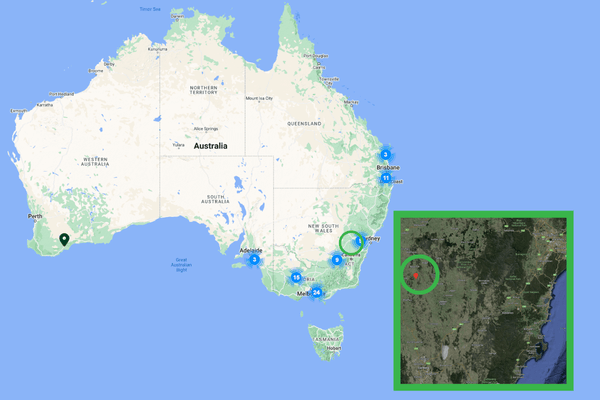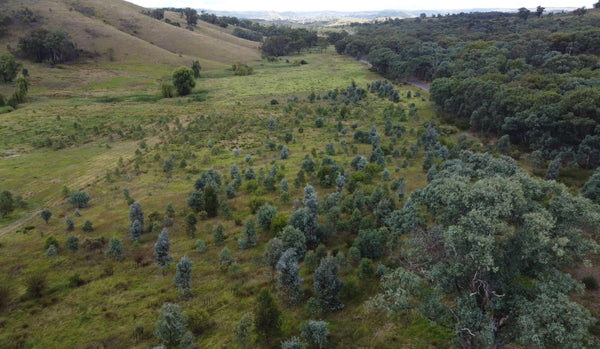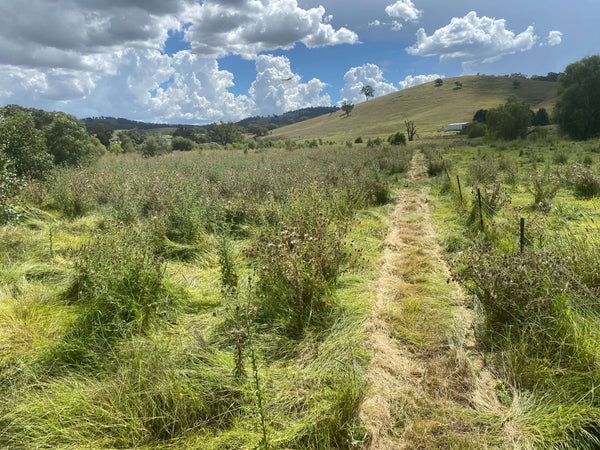Located near Taylors Flat in NSW, Greenfleet is restoring the cleared land at Coopers Crossing to create a biodiverse native forest which is supporting the local native wildlife. Our reforestation efforts are delivering climate action and extending habitat for the endangered Regent Honeyeater.

Location & Map
This remote forest is near Taylors Flat, is on Wiradjuri and Ngunnawal Country, a 2-hour drive north of Canberra, in the Southern Tablelands of New South Wales. Coopers Crossing sits at the bottom of a fertile valley, with a small river, the Callaba Creek, running through it.
This is one of many native reforestation projects that Greenfleet has undertaken in New South Wales since 1997. To see where some of our other projects are growing, you can explore our forest map here.

Revegetation Approach & Species Selection
In 2020, Greenfleet revegetated the property with over 7,600 native seedlings. More than 30 locally native species were carefully selected as a part of the project. Some examples of species chosen to create the forest include Yellow Box (Eucalyptus melliodora) for the tall canopy, River Sheoak (Casuarina cunninghamiana) for midstory vegetation and the understory includes Prickly Tea Tree (Leptospermum continetale).
In March 2020, this region experienced significant rainfall, which assisted in the planting and initial establishment of the trees. We returned in 2022 to plant more trees and bolster the establishing forest. A visit in 2024 shows the forest is doing well and the site has experienced good growth.

Wildlife Habitat Restoration
While this forest is delivering climate action, it will also provide habitat to the region’s native wildlife.
One of the species that may benefit from this revegetation work is the Regent Honeyeater. With their population negatively impacted by land clearing, they are considered critically endangered in NSW and at a federal level.
These striking birds get their name due to their bright yellow and black plumage. Their preferred habitat is eucalypt forests and woodlands, so we have planted Red Box (Eucalyptus polyanthemos), Red Stringybark (Eucalyptus macrorhyncha) and River She-oak (Casuarina cunninghamiana). Our hope is that the forest growing at Coopers Crossing will extend and create habitat for the Regent Honeyeater’s feeding and breeding grounds, as well as other native birds and fauna.
Climate Action
The forest growing at Coopers Crossing is legally protected for 100 years. Over that time, it will remove over 4,200 tonnes of carbon from the atmosphere, which is the equivalent of what around 970 average vehicles emit on Australia’s roads in a single year. The property now has second owners, and our on title protection ensures the future of the forest so it cannot be cut down for any reason, even if the land changes hands.
Location Size
11.45 hectares near Taylors Flat, NSW
Planting Dates
2020, 2022
Species
- Eucalyptus bridgesiana
- Eucalyptus blakelyii
- Eucalyptus camaldulensis
- Eucalyptus cinerea
- Eucalyptus goniocalyx
- Eucalyptus macroryncha
- Eucalyptus mannifera
- Eucalyptus melliodora
- Eucalyptus polyanthemos
- Eucalyptus rossii
- Eucalyptus rubida
- Acacia dealbata
- Acacia deanii
- Acacia implexa
- Acacia penninervis
- Acacia verniciflua
- Acacia acinacea
- Acacia buxifolia
- Acacia decora
- Acacia paradoxa
- Acacia ulcifolia
- Callistemon sieberi
- Cassinia arculeata
- Cassinia longifolia
- Davesia mimosoides
- Dodonea viscosa spp angustifolia
- Bracychiton populeneus
- Bursaria spinosa
- Casuarina cunninghamiana
- Persoona rigida
- Leptospermum continetale


